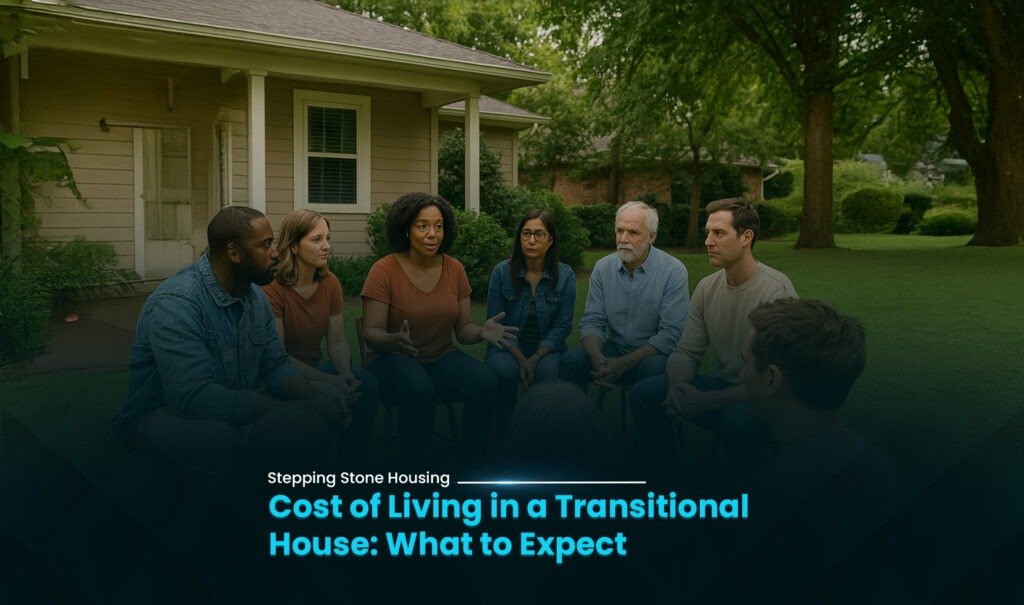What is the Cost of Living in a Transitional House?
First, entering a transitional house marks a significant step toward stability. Furthermore, it offers more than just basic shelter overhead. Additionally, these programs provide crucial support services to help residents rebuild their lives. However, many people wonder about the financial requirements involved. Moreover, “What does transitional housing actually cost?” remains a common question. Therefore, this guide aims to clarify the financial expectations clearly. Subsequently, you will learn about typical fees involved. Similarly, you will understand what expenses programs generally cover.
Understanding the Purpose of Transitional Housing
Initially, transitional housing serves as a temporary bridge between homelessness and stability. Specifically, it helps individuals and families transition from crisis situations. Next, they move toward stable, permanent housing solutions. Furthermore, these programs operate with specific time limits in place. Usually, they last from six months to two years maximum. Meanwhile, the focus centers on empowering residents with essential skills. Consequently, they gain tools for successful independent living. Ultimately, it’s a stepping stone, not a permanent residence option.
Is Transitional Housing Free?
Unfortunately, this represents a common misconception among many people. While some transitional housing programs operate entirely free, many require fees. Moreover, the fee structure varies widely across different programs. Particularly, it depends on the program’s available funding sources. Additionally, it also depends on their specific mission and goals. Notably, many programs operate as non-profit organizations successfully. Furthermore, they receive government grants and community donations regularly. Therefore, this allows them to offer services at reduced costs. However, some programs require residents to contribute financially. Typically, this contribution often follows an income-based calculation method.
Transitional House: Factors Influencing the Cost of Transitional Housing
Certainly, several key factors determine the overall cost structure. Therefore, understanding these helps manage realistic expectations effectively.
Program Funding and Grants
Significantly, government funding heavily influences program costs and fees. Specifically, programs receiving federal grants, like HUD funding, often charge lower fees. Meanwhile, some programs operate entirely on community donations received. Consequently, these might offer completely free services to residents. However, programs with limited grant funding may charge more. Obviously, they need adequate revenue to cover operational costs effectively.
Transitional House: Program Type and Focus
Notably, different types of transitional housing maintain different cost structures. For example, sober living homes, for example, might charge weekly fees. Specifically, these fees cover rent and structured support services provided. Meanwhile, programs for specific populations, like veterans, might operate free. Generally, this often depends on their designated funding sources available.
Location of the Transitional Housing
Clearly, cost of living varies significantly by city and state. Therefore, transitional housing in expensive areas might cost more accordingly. Specifically, this reflects the higher overhead expenses for programs. Generally, urban centers typically maintain higher operational costs than rural areas. In contrast, rural areas may offer lower fees to residents.
Transitional House: Services Provided
Importantly, the range of services directly impacts overall costs. Consequently, programs offering extensive services might charge higher fees. Specifically, these services include intensive case management and counseling. Additionally, they also cover job training and life skills development. In contrast, basic programs might cost less for residents. Obviously, more comprehensive support often comes with additional costs.
What Fees to Expect in Transitional Housing
Generally, if a transitional housing program charges fees, they typically follow specific structures.
Sliding Scale Fees
Commonly, many programs use a sliding scale fee system. Specifically, this means fees depend on your current income level. Furthermore, as your income increases, your contribution might increase too. Therefore, this ensures affordability for all residents participating. Additionally, it also encourages residents to find stable employment opportunities.
Transitional House: Flat Monthly or Weekly Fees
Alternatively, some programs charge a flat fee to residents. Specifically, this fee remains a set amount consistently. Moreover, it might be charged weekly or monthly regularly. Therefore, this provides predictability for budgeting purposes effectively. Similarly, it simplifies financial planning for all residents involved.
Percentage of Income
Commonly, a common model uses a percentage of income earned. Specifically, residents pay a set percentage of their earnings. Therefore, this encourages financial responsibility and accountability among residents. Additionally, it also ensures fees adjust with income changes. For example, you might pay 30% of gross income.
Initial Deposit or Fees
Sometimes, some programs require an initial deposit from residents. Specifically, this might be a refundable security deposit required. Alternatively, it could be a one-time administrative fee instead. Therefore, always ask about these upfront costs before committing.
Transitional House: What Expenses Are Typically Covered?
Fortunately, transitional housing programs cover many essential living expenses. Therefore, this helps residents save money for future goals. Consequently, it allows them to focus on rebuilding their lives.
Shelter and Utilities
Generally, the basic cost of housing stays almost always covered. Specifically, this includes rent or occupancy fees charged monthly. Additionally, utilities like electricity, water, and gas get included typically. Furthermore, some programs also cover internet access for residents.
Meals or Food Assistance
Commonly, many programs provide regular meals to all residents. Specifically, they might maintain a communal dining area available. Alternatively, some offer food stipends instead of meals directly. Meanwhile, others connect residents to local food banks available. Therefore, this reduces a significant living expense for residents.
Transitional House: Case Management
Importantly, dedicated case management represents a core service provided consistently. Therefore, the cost of this individualized support gets included automatically. Specifically, case managers help residents set realistic goals effectively. Additionally, they connect residents to community resources available locally.
Life Skills Training
Regularly, workshops and training sessions remain integral to success. Specifically, these cover budgeting, cooking, and job readiness skills. Therefore, the cost of these educational programs stays covered. Ultimately, these skills prepare residents for independent living successfully.
Counseling and Support Groups
Fortunately, mental health and substance abuse support gets included often. Specifically, this means access to qualified counselors regularly available. Additionally, it also covers participation in support groups offered. Therefore, these services remain vital for healing and recovery.
Transitional House: What Expenses Are NOT Typically Covered?
However, while many costs get covered, residents usually handle personal expenses. Therefore, these remain important to budget for carefully.
Personal Care Items
Unfortunately, toiletries, hygiene products, and cosmetics represent personal expenses entirely. Therefore, residents stay responsible for purchasing these items regularly. Consequently, budgeting for these items becomes necessary for daily living.
Transportation
Generally, while some programs offer limited transportation services, most personal travel isn’t covered. Specifically, this includes bus fares or gas for vehicles. Therefore, you might need to budget for commuting to work.
Transitional House: Clothing
Unfortunately, residents remain responsible for their clothing needs completely. Specifically, this includes everyday wear and professional attire required. However, programs might offer referrals to local clothing banks available.
Personal Entertainment
Generally, leisure activities and entertainment costs stay personal expenses entirely. Specifically, these include movies, hobbies, or social outings planned. Therefore, these expenses don’t get covered by programs offered.
Medical Co-pays and Prescriptions
Typically, basic healthcare connections get made by case managers. However, co-pays for doctor visits usually aren’t covered. Similarly, prescription medication costs also typically remain the resident’s responsibility. Nevertheless, programs might help navigate insurance options available though.
Transitional House: Debt Repayment
Unfortunately, transitional housing doesn’t cover existing debts from residents. Specifically, this includes credit card debt or old bills. However, programs might offer financial counseling services instead. Therefore, this helps residents manage their debt more effectively.
Financial Expectations While in Transitional Housing
Fortunately, being in transitional housing offers a unique financial opportunity.
Focus on Saving
Importantly, with many expenses covered, residents can focus on saving. Therefore, this becomes crucial for securing permanent housing later. Specifically, build an emergency fund for unexpected expenses. Additionally, save for a security deposit on future housing.
Transitional House: Income Growth
Actively, programs actively encourage employment among all residents consistently. Therefore, as your income grows, your financial situation improves significantly. Consequently, this prepares you for successful independent living ahead.
Financial Literacy
Fortunately, you will gain valuable financial skills through programs offered. Specifically, budgeting, saving, and managing money become top priorities. Therefore, these skills will serve you well after leaving. Ultimately, they create lasting financial stability for residents.
Limited Spending
Generally, the structured environment often means limited discretionary spending opportunities. Therefore, this helps prioritize essential needs over wants effectively. Consequently, it discourages impulsive purchases that drain resources unnecessarily.
Transitional House: How to Prepare Financially for Transitional Housing
Importantly, if you are considering transitional housing, some preparation helps significantly.
Understand Your Income
First, know your current income sources before applying to programs. Specifically, this includes employment, benefits, or disability payments received. Therefore, this helps determine potential fees you might pay.
Research Program Costs
Initially, contact specific programs directly to inquire about fees. Specifically, ask for a clear breakdown of covered expenses. Similarly, ask about uncovered expenses you’ll handle personally.
Budget for Personal Needs
Therefore, create a small personal budget for essential items. Specifically, include items like toiletries, transportation, and communication costs. Consequently, this prevents unexpected financial strain during your stay.
Transitional House: Save What You Can
Importantly, even small savings help during the transition period significantly. Therefore, any money saved before entering can ease adjustment. Consequently, it provides a cushion for personal expenses you’ll encounter.
Conclusion: Investing in Your Future Through Transitional Housing
Clearly, the cost of living in transitional housing isn’t always free. However, the fees generally remain affordable for most residents. Specifically, they get designed to be sustainable long-term solutions. Therefore, these programs cover many essential living expenses effectively. Consequently, they free up resources for personal growth activities. Therefore, this allows residents to focus on self-improvement goals consistently. Moreover, they gain vital life skills for independent living success. Additionally, they build financial stability for their future planning. Therefore, understanding these financial aspects helps you prepare adequately beforehand. Consequently, it empowers you to take full advantage of opportunities. Ultimately, transitional housing represents an investment in your future success. Finally, it’s a proven pathway to lasting independence and stability.
National Hot Line for Homelessness


